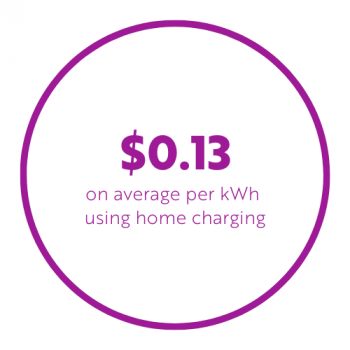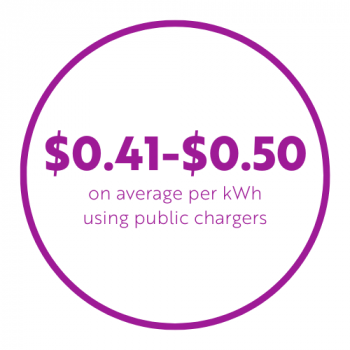
The Ultimate Guide to EV Charging: Everything You Need to Know
The basics of EV charging are simple: plug in your vehicle at home, work, or public stations. Here's what you need to know about charging your electric vehicle effectively.
Charging Levels and Speeds
Level 1 (120V):
- Standard home outlet charging
- Adds 3-5 miles of range per hour
- Perfect for overnight charging
- No additional installation needed
Level 2 (240V):
- Available at homes, workplaces, and public locations
- Adds 25-30 miles of range per hour
- Requires special installation at home
- Most common for regular charging
DC Fast Charging:
- Found at public stations only
- Adds 100-200 miles in 30 minutes
- Not available for home use
- Best for long-distance travel

Purple electric charging cost infographic

Public EV charging price comparison
Charging Costs
Home Charging:
- Average cost: 13¢ per kWh
- Full charge (80kWh battery): ~$10.40
- Most economical option
Public Charging:
- Cost: 41-50¢ per kWh
- Full charge (80kWh battery): $32.80-$40
- More expensive but convenient for long trips
Charging Connectors

Electric vehicle CCS charging port icon

J1772 Type 1 charging connector
Main connector types:
- NACS (Tesla standard, becoming industry standard)
- CCS (Common on current EVs)
- CHAdeMO (Being phased out)
- J1772 (Standard for Level 2 charging)
Best Charging Practices
- Start charging at 30% battery level
- Charge to 80% instead of 100%
- Use appropriate adapters when needed
- Follow charging etiquette at public stations
- Plan charging stops for long trips
Finding Charging Stations
- Use manufacturer apps
- Public charging station locators
- Workplace charging programs
- Home charging installation services
The charging infrastructure continues to expand, with approximately one charger for every 15 gas stations nationwide. Most EV owners charge at home, making the transition from gas vehicles convenient and cost-effective.
For optimal battery life and performance, maintain regular charging habits and avoid frequently depleting the battery to 0% or consistently charging to 100%. With proper care, EV batteries typically last beyond the vehicle's natural lifespan, often maintaining significant capacity after 12 years of service.
Related Articles

